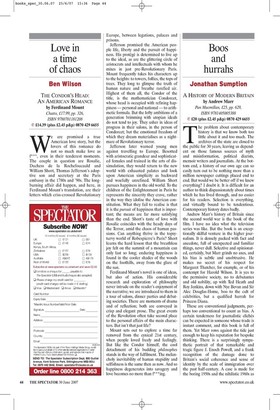Love in a time of chaos
Ben Wilson THE CONDOR'S HEAD: AN AMERICAN ROMANCE by Ferdinand Mount Chatto, £17.99, pp. 326, ISBN 9780701181208 © £1439 (plus £2.45 p&p) 0870 429 6655 We are promised a true American love story, but the lovers of this romance do not so much make love as f***, even in their tenderest moments. The couple in question are Rosalie, Duchess de la Rochefoucauld and William Short, Thomas Jefferson's adoptive son and secretary at the Paris embassy in the 1780s and '90s. The longburning affair did happen, and here, in Ferdinand Mount's translation, are their letters which criss-crossed Revolutionary Europe, between legations, palaces and prisons.
Jefferson promised the American people life, liberty and the pursuit of happiness. His protégé is determined to live up to the ideal, as are the glittering circle of aristocrats and intellectuals with whom he mixes in just pre-Revolutionary Paris. Mount frequently takes his characters up to the heights: to towers, follies, the tops of trees. They long to glimpse the truth of human nature and breathe rarefied air. Highest of them all, the Condor of the title, is the mathematician Condorcet, whose head is occupied with refining happiness — personal and national — to arithmetic formula. But the lofty ambitions of a generation brimming with utopian ideals do not tend to joy. They usher in ideas of progress in their salons, in the person of Condorcet; but the emotional freedom of which they dream materialises as a nightmare of Revolutionary terror.
Jefferson later warned young men against travelling to Europe. Besotted with aristocratic grandeur and sophisticated females and trained in the arts of dissimulation, they would return to the new world with exhausted palates and look upon American simplicity as backward and woefully unrefined. William Short pursues happiness in the old world. To the children of the Enlightenment in Paris he represents the sincerity they crave, rather in the way they idolise the American constitution. What they fail to realise is that it is the pursuit of happiness that is important; the means are far more satisfying than the end. Short's taste of love with Rosalie coincides with the heady days of the Terror, amid the chaos of human passions. Can anything thrive in the topsyturvy world of Robespierre's Paris? Short learns the hard lesson that the breathless joy felt on the summit of a mountain can only last so long; enduring happiness is found in the cooler shades of the woods on the foothills, away from the glare of the sun.
Ferdinand Mount's novel is one of ideas, but also of action. His considerable research and exploration of philosophy never intrude on the reader's enjoyment of the narrative; we are introduced to them in a tour of salons, dinner parties and debating societies. There are moments of drama and of reflection; both are conveyed in crisp and elegant prose. The great events of the Revolution often take second place to the personal affairs of the main characters. But isn't that just life?
Mount sets out to explore a time far removed from the cynical 21st century, when people loved freely and feelingly. But like the Condor himself, the cool detachment of his budding philosophes stands in the way of fulfilment. The melancholy inevitability of human stupidity and selfishness is the same then as now. And so happiness degenerates into savagery and love becomes no more than f***ing.


















































































 Previous page
Previous page